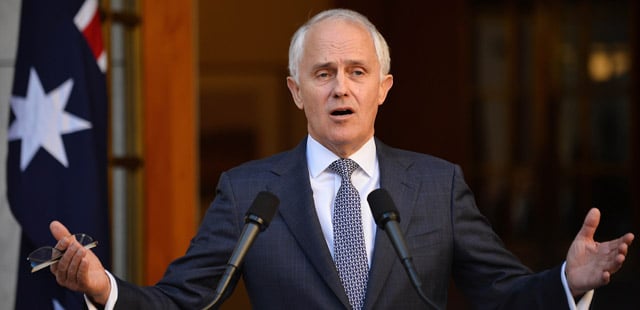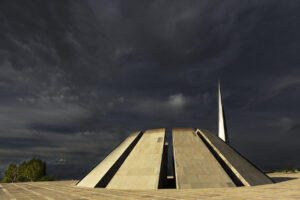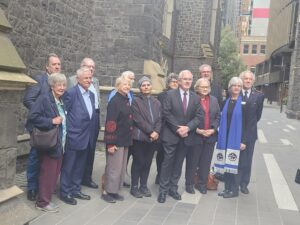What can Christians expect from our new prime minister? Roy Williams considers Malcolm Turnbull’s religious beliefs.

PHOTO: AFP VIA AAP / PETER PARKS
By Roy Williams
1 October 2015
Much has been written of Turnbull’s worldly achievements in the law, banking and business, his stormy political career since 2004, and his imposing personal wealth (A$183 million when last disclosed publicly in 2010). But what of his core religious beliefs? As the late Kim Beazley Snr once observed, “in our secular age, biographers rarely give a person’s spiritual life the attention it deserves”.
Although I have not yet had the chance to interview him, much may be gleaned from the public record.
“I definitely believe in God,” Turnbull told the ABC’s Australian Story in 2009. But it was not always so. He admitted in the same interview that “I didn’t have a particularly religious upbringing at all”. As a boy in the 1960s he was an occasional Sunday worshipper at Randwick Presbyterian church in eastern Sydney, and as a precocious teenager at Sydney Grammar School he is reputed to have engaged in private discussions about religion with his headmaster. But by the time he was a young man he was proclaiming to friends that he was an agnostic.
It is true that when he married Lucy Hughes, in Oxfordshire in March 1980, the ceremony took place in a church – but it was an Anglican church. At that time neither Turnbull nor Lucy was religiously committed. The brash Turnbull, then 25, resorted to lawyerly sophistry to persuade the local Church of England priest to solemnise the union: “You are part of an established church,” he argued. “So you’re like a public servant, and you have a duty to prevent fornication in your parish.”
When and why did Turnbull recover a belief in God? The record is unclear. What is known is that by mid-2002 (when he was 47) he had converted to the faith of his wife’s family, Roman Catholicism. At that time, when asked to comment by The Sydney Morning Herald, he replied that his religious beliefs were “off limits”. The inquisitive journalist, Valerie Lawson, speculated about a “midlife search for meaning”. At any rate, Turnbull has been a practicing Catholic ever since.
He visited the Vatican in 2006 and on the occasion of World Youth Day in 2008 prayed publicly that the event might “fill the world with Christ’s love”. There seems no doubt he has a genuine interest in theology. It would appear, however, that his faith is still evolving. “I think religion is very much a mystery,” he has said. “It’s very hard; it’s not something that’s readily rationalised.”
Three people stand out as key religious influencers in Turnbull’s life: his parents and his wife.
It was from his father Bruce that Turnbull inherited his boyhood Presbyterianism. He is a direct descendant of John Turnbull (1751-1834), one of the first Scottish-born free settlers in New South Wales. A tailor, Turnbull arrived in the colony in 1802 and was involved with James Mein and others in the establishment of the Ebenezer Church at Portland Head in the Hawkesbury district. Built in 1809, it still stands and is the oldest church building in Australia.
Malcolm Turnbull remains justifiably proud of this heritage. He has visited Ebenezer several times and contributed generously to its restoration and upkeep.
From his mother Coral – whose abandonment of the family when her son was nine caused deep emotional hurt – Turnbull inherited his enquiring mind. Part Jewish, she was a highly cultivated woman with an unconventional spiritual side. According to Lucy, she once tried to interest the young Malcolm in religion by taking him to the local “Christian Science place” in Rose Bay.
But it is his wife Lucy who has had the greatest influence on Turnbull – religiously as in most other respects. As a teenager Lucy had a sudden crisis of faith while sitting in her school chapel, but began going to Mass again in the mid-1990s, at Sydney’s St Mary’s Cathedral. Her beloved father, T.E.F. (Tom) Hughes QC, federal attorney-general in the Gorton Government, also returned to the Catholic fold as an adult through the “wise advocacy” of Father Emmet Costello, a legendary Jesuit priest in Sydney (who was also a mentor to the young Tony Abbott).
When Turnbull rediscovered religion he evidently followed his wife’s lead. During the Catechumenate process he received instruction from a Jesuit priest, Father Michael Kelly, and now attends Mass periodically at the Church of St Mary Magdelene in Sydney’s Rose Bay.
Turnbull has described himself as “a very imperfect Catholic”. Frankly, much of his stated philosophy is hard to reconcile with the social and moral teachings of his church.
In general, he is of the “dry” right on economics – a disciple of lower taxes and the capitalist free market. He castigated the Rudd Government’s fiscal stimulus measures during the GFC in 2008-09, and never criticized the basic unfairness of the Abbott Government’s hated 2014 budget (as opposed to the inept attempts to “sell” it). (See also his 2009 Menzies Lecture, an ode to getting government “out of the hair and pockets” of business; compare Pope Benedict XVI’s 2009 encyclical Caritas in Veritate, a scathing indictment of plutocracy.)
On many social issues, Turnbull is of the permissive left. He is a well-known supporter of state-sanctioned same-sex marriage and voted for the “morning after” abortion drug RU-486 in 2006.
He once told the ABC: “Australians want to be free. They want to have independence… We [the Liberal Party] err on the side of respecting individual judgement and individual choices.”
This philosophy – libertarianism – is more or less the opposite of the Vatican’s. And of many Protestant churches also. The former Anglican Archbishop of Sydney, Peter Jensen, wrote in his 2008 book The Future of Jesus: “I think that Jesus would dispute all of Malcolm Turnbull’s positions.”
However on a few social issues – such as the discouragement of divorce – he talks like a Christian conservative. He published a learned paper in 2003 entitled “Is the West Dying Out? family, fertility and survival”. B.A. Santamaria himself would have approved.
As prime minister, Turnbull will be hamstrung politically if he is inclined to follow his church’s teachings on issues such as the treatment of asylum-seekers. Since 2001, the Coalition’s hardline policies have been quite at odds with the Vatican’s pronouncements.
And yet… there are grounds for optimism.
For a start, Turnbull has promised a return to collegiate cabinet government. In his John Monash Oration of 2013, he said: “There is a great deal of truth in that passage from Proverbs 11 which is set into a mosaic in the entrance to the Victorian Parliament. ‘Where no counsel is, the people fall: but in the multitude of counsellors there is safety’. And there is also wisdom.”
More generally, Turnbull is a thoughtful, rational ecumenicist. He seems less likely than his predecessor to be spoiling for a part in the Americans’ next foreign war, to curtail precious civil liberties, or to dog-whistle on issues of race. He has a fine record on issues of religious pluralism, having often spoken up for (among others) Muslims and Jews.
On the millennial issue of climate change, he recently said that “everyone will give great weight to Pope Francis’ encyclical [Laudato si]”. It is a call to action.
Roy Williams’ latest book is Post-God Nation? How religion fell off the radar in Australia… and what might be done to get it back on (ABC Books). Read Barney Zwartz’s review from September TMA here.







